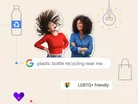How Google is Supporting E-Waste Recycling

The world faces a mounting challenge with electronic waste (e-waste). Currently, just 22% of e-waste is responsibly recycled globally.
By the year 2030, it's projected that the world will generate a staggering 82 million tonnes of e-waste.
This enormous amount can waste valuable materials like gold and lithium, often ending up in landfills.
“One of the biggest barriers to proper electronics recycling is simply knowing where and how to do it,” explains Robert Little, Sustainability Strategy Lead for gTech at Google.
“Of course, to truly embrace a circular economy, we need to go beyond simply recycling. It's about thinking holistically about the entire lifecycle of our devices.”
Google has implemented a feature known as the “recycling attribute” within its business profiles to tackle this issue.
Introducing Google’s recycling attributes
Google's recycling attribute feature assists users in locating recycling services by displaying specific recycling attributes for businesses.
These attributes inform customers whether a local business offers drop-off services for recyclable materials, highlighting their commitment to sustainability.
Multiple recycling categories can be represented within a single business profile, helping users swiftly identify appropriate recycling venues.
- Clothing
- Batteries
- Electronics
- Household hazardous waste
- Glass bottles
- Light bulbs
- Ink cartridges
- Plastic bags
- Metal cans
- Plastic foam
- Plastic bottles
Businesses display these attributes on their Google Business Profile, visible in Google Searches and on Google Maps.
Moreover, businesses have the autonomy to tailor their recycling attributes on their profiles while customers can also propose edits on Google Maps and Search.
Google's recycling attributes in action
A practical example of these recycling attributes highlighted by Google is a clothing swap enterprise named R:evolve Recycle in Glasgow, Scotland.
This venture was started in 2015 by a dedicated group of volunteers and has expanded into three shops.
Here, customers can swap old garments for others that have been donated, fostering sustainable fashion choices.
To date, R:evolve has prevented more than 41,000kg of clothing from ending up in landfills and has significantly reduced CO₂ emissions by 869.8 tonnes.
When someone searches for “clothing recycling in Glasgow” through Google, R:evolve and similar businesses with the recycling attribute are displayed, supporting consumers to choose sustainable practices.
Broader recycling initiatives by Google
Google's commitment to sustainability stretches beyond recycling attributes.
The tech giant is actively pushing towards a circular economy by integrating waste reduction and pollution eradication into its operations and product designs.
Notable initiatives include the Single-Use Plastics Challenge and achieving zero waste to landfill status at all its global data centres.
During 2023, 44 million hardware components from Google’s data centres were reintroduced into the secondary market, illustrating the potential of reusing and repurposing materials.
In collaboration with major brands like Amazon and Apple, Google also supported a pilot by Retrievr to collect e-waste directly from households in Colorado, USA, helping to divert e-waste from landfills.
“Globally, only about 20% of post-consumer e-waste ever makes it to the recycling stream,” says David Bourne, Google Consumer Hardware’s Sustainability Strategist.
“A lot of recycled materials are currently coming from post-industrial recycled content, which has a naturally limited scope of availability. As demand for recycled materials in products increases, post-industrial recycled scrap is not going to be enough to fulfil that.”
Make sure you check out the latest industry news and insights at ClimateTech Digital and be part of the conversation at our global conference series, Sustainability LIVE.
Discover all our upcoming events and secure your tickets today. Subscribe to the ClimateTech Digital newsletter.
ClimateTech Digital is a BizClik brand

